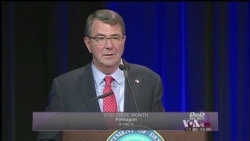Defense Secretary Ash Carter on Tuesday unveiled an updated equal opportunity policy to bar discrimination based on sexual orientation in the armed forces, putting it in the same category as discrimination based on race, religion, color, age and sex.
The watershed moment came as Carter delivered a keynote speech at the Pentagon marking a gay and lesbian pride celebration.
“Four years after the repeal of ‘Don’t Ask, Don’t Tell,’ following years and years of gay and lesbian service members having to hide who they are, today we take pride in how they’re free to serve their country openly,” he said.
The change in policy gives U.S. military troops a broader range of choices in pursuing complaints if they believe they have been discriminated against based on sexual orientation.
The change brought the rules into conformity with the 2011 decision to end the military's "Don't Ask, Don't Tell" policy — adopted by the Clinton Administration in 1994 — which allowed gays and lesbians to serve in the military only if they did not openly acknowledge their sexual orientation.
Times, though, have changed.
“Here at the Pentagon, we have been — and remain — strongly committed to making sure all our military families and spouses can fully and equally receive the benefits their loved ones have earned,” Carter said in announcing the decision.
The move comes on the heels of an announcement Monday by the American Medical Association that there is no medically valid reason to exclude transgendered personnel from military service. While some branches of the military can still remove transgendered service members, the Army and Air Force have already made it more difficult to do so, which is ultimately more in line with the ever-changing climate of tolerance in the United States.
“Young Americans today are more diverse, open and tolerant than past generations, and if we’re going to attract the best and brightest among them to contribute to our mission of national defense, we have to ourselves be more open, diverse and tolerant, too," Carter said. "It’s the only way to compete in the 21st century.
"We have to focus relentlessly on our mission, which means the thing that matters most about a person is what they can contribute to national defense," he added. "This is a commitment we must continually renew."
Civilian employees of the Defense Department were already protected against discrimination based on sexual orientation under equal opportunity laws. But uniformed personnel were covered under separate rules affected by the department's long-time ban on gays and lesbians serving openly in the military.
A 2013 Supreme Court ruling provided some federal benefits to same-sex couples married in states where gay marriage is legal. The Pentagon has been working to bring its policies into line with the changes.
"With this policy revision, we are now ensuring that service members are afforded protection against discrimination in the Department's military equal opportunity program," said Navy Lieutenant Commander Nate Christensen, a Pentagon spokesman.
Christensen said the military equal opportunity program gives troops greater access to a broader range of options for resolving discrimination complaints and gives commanders access to equal opportunity advisers during the complaint process.
Groups advocating lesbian, gay, bisexual, and transgendered (LGBT) rights groups have long called for equal protection from discrimination. June is LGBT Pride Month.
Portions of this report are from Reuters.





